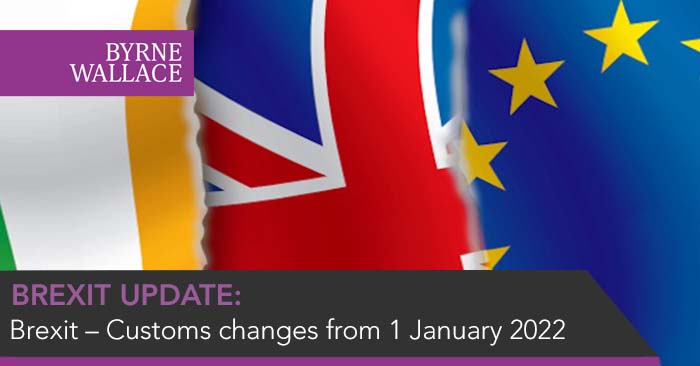Brexit – Customs changes from 1 January 2022
Wednesday, 12 January 2022
From 1 January 2022, there are changes to the rules on when a preferential zero tariff may be claimed on goods traded between the EU and the UK, following the expiry of a transition period in EU law. This will impact Irish businesses exporting and importing goods to and from the UK.
Background
The EU-UK Trade & Co-operation Agreement (TCA) allows goods exported from the EU to the UK to benefit from a zero rate of customs duty (known as a preferential tariff) where the goods originate in the EU. Similarly, goods imported from the UK into the EU may benefit from a preferential tariff where they originate in the UK.
For customs purposes, the origin of goods is effectively their ‘economic nationality’, and is normally where they (or the materials and components used to make them) are produced or manufactured. Whether goods qualify as EU or UK origin is determined by detailed product-specific rules of origin in the TCA. These rules are particularly important where products have been produced using components or materials from more than one country.
In order to show that goods are of EU origin, an EU exporter will normally provide a ‘statement of origin’ to the UK customer/importer.
Changes from January 2022
From 1 January 2022, where the manufacturing or processing applied to the goods by the exporter is not in itself sufficient to confer EU origin, the exporter should normally obtain formal declarations from its own suppliers about the origin of their goods (known as a ‘supplier’s declaration’) before issuing a statement of origin.
This could apply, for example, if an Irish trader exports goods to the UK, and acquired those goods from an Irish manufacturer or wholesaler. The Irish exporter would need to ask its supplier for a supplier’s declaration that the goods are of EU origin before issuing a statement of origin. A supplier’s declaration is also needed where an exporter manufactures or processes goods itself but needs to show, under the relevant product-specific origin rules, that its components or raw materials have EU or UK origin.
Until 31 December 2021, EU exporters did not need suppliers’ declarations to issue statements of origin provided they obtained the declarations by 1 January 2022. If the EU exporter did not have any relevant declarations by that date, it must inform its UK importer by 31 January 2022.
The UK also applied a similar temporary easement until 31 December 2021.
Next steps for businesses
Irish exporters should ensure they have appropriate supplier’s declarations (where needed) before issuing a statement of origin under the TCA. A supplier’s declaration can be made out to cover a single supply or to cover regular supplies made over a period of time up to a maximum of two years (a long-term supplier’s declaration).
HMRC in the UK can potentially ask the Irish Revenue to audit an exporter’s customs compliance if they believe EU preferential origin is being applied incorrectly. If the exporter cannot provide this supporting evidence to Revenue, it may be charged a penalty and its UK customer will be liable to pay the full (non-preferential) rate of customs duty.
Similarly, Irish importers may wish to ask their UK suppliers to provide them with contractual comfort that any UK statement of origin is correct and that the exporter holds appropriate declarations from its suppliers.
While both the Irish Revenue and UK HMRC have taken a relatively light touch approach to some customs procedural requirements in 2021 to keep trade flowing, we expect more enforcement action in 2022.
Northern Ireland
The above changes do not impact trade between the Republic of Ireland and Northern Ireland. Under the Northern Ireland Protocol to the Brexit Withdrawal Agreement, Northern Ireland remains subject to EU customs rules, and no customs declarations or tariffs are required when goods move directly between the EU and Northern Ireland.
Other customs changes from January 2022
Imports into the UK
In general, from 1 January 2022, a full customs declaration must be made for any goods arriving in Great Britain (i.e. the UK other than Northern Ireland) from the EU. Pre-notification requirements also apply for goods subject to sanitary and phytosanitary (SPS) controls.
However, these changes do not apply to goods moving into Great Britain from the Republic of Ireland while negotiations continue between the UK and EU over the Northern Ireland Protocol. For these goods, customs declarations may continue to be deferred for up to 175 days. This applies even where the goods come from elsewhere in the EU and are moved through Ireland en route to Great Britain.
The UK will introduce further changes for imports from 1 July 2022 (including physical checks on SPS goods), but it is not yet clear whether these will apply to goods from Ireland.
Changes to commodity codes
Following a review of the Harmonised System used by most countries as the basis of their tariff classification systems, both the EU and the UK changed some of their commodity codes with effect from 1 January 2022. Importers and exporters should ensure they are using the correct codes going forwards, to ensure the correct duties are paid.
For further information, or advice or assistance with your customs requirements when trading with the UK or other countries, please contact Lee Squires (Partner and Head of Indirect Taxes) or any member of the ByrneWallace Tax Advisors team.

